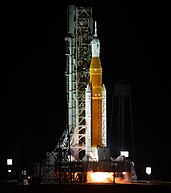
Back Спіс касмічных запускаў у 2022 годзе Byelorussian Liste der orbitalen Raketenstarts (2022) German پرواز فضایی در ۲۰۲۲ Persian 2022 en astronautique French 2022 באסטרונאוטיקה HE Astronautika u 2022. Croatian 2022. gads kosmonautikā Latvian/Lettish 2022 w lotach kosmicznych Polish 2022 în zborul spațial Romanian Список космических запусков в 2022 году Russian
Nuri rocket Shackleton crater captured by Danuri ISS's Expedition 66 and Soyuz MS-20 Tiangong's Shenzhou 14 and 15 crew | |
| Orbital launches | |
|---|---|
| First | 6 January |
| Last | 30 December |
| Total | 186 |
| Successes | 178 |
| Failures | 7 |
| Partial failures | 1 |
| Catalogued | 169 |
| National firsts | |
| Satellite | |
| Space traveller | |
| Suborbital launch | |
| Rockets | |
| Maiden flights | |
| Retirements | |
| Crewed flights | |
| Orbital | 7 |
| Orbital travellers | 24 |
| Suborbital | 3 |
| Suborbital travellers | 18 |
| Total travellers | 42 |
| EVAs | 15 |
The year 2022 witnessed the number of launches of SpaceX's Falcon rocket family (61 launches) surpassing the CNSA's Long March rocket family (53 launches), making the United States the country with the highest number of launches in 2022 instead of China. This year also featured the first successful launch of Long March 6A, Nuri, Angara 1.2, Vega-C, Kinetica-1, and Jielong-3. National space agencies' activities in this year is also marred by the Russian invasion of Ukraine, leading to tension between Roscosmos and Western space agencies, threats of ending collaboration on the International Space Station (ISS), and delays on space missions.
In terms of national-level scientific space missions, this year is a focal year on lunar exploration. 2022 saw the launch of NASA's CAPSTONE orbiter, KARI's Danuri orbiter and NASA's Artemis 1, the first mission of the Artemis program. In particular, Artemis 1 has two major goals: testing the Orion spacecraft and Space Launch System, and deployment of CubeSats. This year also saw the impact of Double Asteroid Redirection Test on Dimorphos marking the first time a planetary defense technique is tested, NASA's Juno flyby of Europa, and the loss of communication from ISRO's Mars Orbiter Mission and NASA's InSight Martian probe.
Two crewed space stations, the ISS and Tiangong, are in operation in 2022. This year also marks docking of Wentian and Mengtian modules to Tiangong. In terms of crewed missions, the ISS saw Expedition 66, 67, and 68, while Tiangong saw Shenzhou 13, 14, and 15. The ISS also briefly hosted private crews of Soyuz MS-20. The ISS also saw docking of Starliner's Boeing Orbital Flight Test 2.
This year also saw the first time citizens of Egypt and Portugal crossed the 50 mi (80 km) altitude mark, which is the United States's definition of outer space. They did so in a suborbital launch organized by Virgin Galactic, however, they did not managed to cross the Kármán line (100 km or 62 mi). Slovenia performed its first ever suborbital launch in 2022. Moldova, Armenia, Uganda and Zimbabwe have their own satellite in orbit for the first time in 2022.
© MMXXIII Rich X Search. We shall prevail. All rights reserved. Rich X Search





